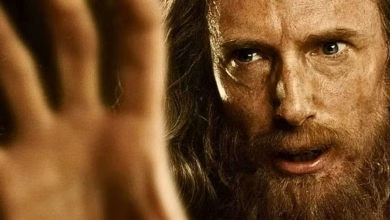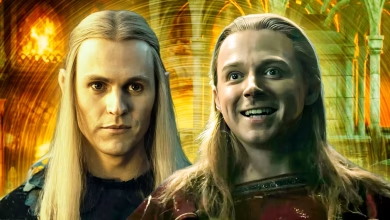The Secret Fire in ‘Rings of Power’ Basically Confirms the Stranger’s Identity
Tom Bombadil (Rory Kinnear) is back in this week’s episode of The Lord of the Rings: The Rings of Power, “Where Is He?,” sharing more about what the Stranger’s (Daniel Weyman) role is as an Istar in Middle-earth. Still confused about how he is supposed to grow powerful enough to stand up to Sauron (Charlie Vickers), the Stranger asks Tom about his powers, and how he can “master the Secret Fire.” Tom is taken aback by this question — no one “masters” the Secret Fire, after all! – and things seem even more confusing. So what is this Secret Fire that the Stranger needs to learn how to wield?
The Secret Fire Is the Power of Life and Creation in ‘Lord of the Rings’

When they talk about the Secret Fire, it feels like the Stranger and Tom Bombadil are first talking about superpowers, and then about something like the Force in Star Wars. The Secret Fire is more complex than that, though, and is tied to the many philosophical and religious motifs J.R.R. Tolkien used as inspiration when writing the lore in his Legendarium. Simply put, the Secret Fire (also known as the “Flame Imperishable”) is the creative power of Erú Ilúvatar, the supreme being who created the world of Middle-earth and the Legendarium’s equivalent to God.
The Secret Fire is often associated with the essence of life and creation, described as the power that gives vitality and existence to all things. It plays a key role in the creation of the Ainur (angelic beings such as the Valar) and the entire world of Arda in The Silmarillion. Ilúvatar revealed his vision of creation to the Ainur through a divine symphony known as the Ainulindalë, or the Music of the Ainur (which is depicted in the Season 1 opening credits). Though the Ainur contributed to this music, it was Ilúvatar who gave it true life by sending the Flame Imperishable to the heart of the newly created world.
Although the Ainur are certainly powerful and can shape and govern parts of the world, they can’t create life on their own. The Secret Fire, held only by Ilúvatar, is the source of all life, and it is only through his will that the world and its inhabitants come into being. The Flame is part of every soul (or “fëar”) created by Ilúvatar, including Elves and Men. He also imbued the Dwarves with it, after the Valar Aulë created them. The Ainur’s role was to help shape the world, but only Ilúvatar, through the Secret Fire, could give it vitality — and this ended up making some of the Ainur jealous.
Morgoth Tried To Steal the Secret Fire for Himself

Aulë may have created the Dwarves, but he immediately regretted it, confessing to Ilúvatar that he did not intend any kind of rebellion through it. Even so, there were other Ainur that envied the power of life and creation that only Ilúvatar held, including the most powerful of the Ainur, Melkor — also known as Morgoth. He always craved the power of creation for himself, and antagonized Ilúvatar from the very beginning of the Ainulindalë. Melkor initially intended to sing his own song, but with every correction by Ilúvatar, he started wanting to confuse the other Ainur, too.
In his pride and lust for power, Melkor seeks the Secret Fire, hoping to master it and bend it to his will. He wanders the Void searching for it but is unable to find it; after all, the Flame Imperishable is held by Ilúvatar alone. This failure frustrates Melkor even further. Unable to create life himself, he turns instead to corrupting and marring the creations of Ilúvatar and the other Ainur. Instead of becoming a true creator, Melkor becomes a destroyer, twisting things that already exist — like the Elves he corrupts into Orcs, for example.
The Secret Fire is vital to understand not only Morgoth’s evil nature, but also Tolkien’s idea of creation and the story he tells with the Ainulindalë. For him, creation is an act of love and harmony, something that Morgoth, in his pride, is never able to achieve. So, Morgoth’s desire for the Secret Fire represents his inability to truly create, which sets him apart from the benevolent forces in Tolkien’s Legendarium.
The Secret Fire Gives More Evidence That the Stranger Is Gandalf
When the Stranger asks about “mastering” the Secret Fire, Tom Bombadil tells him that, although it may show glimpses of the future as clear as the past, it doesn’t need a master. The Secret Fire is the power of life itself, and is part of all living things. Melkor wanted to master it and failed. So, one doesn’t master the Secret Fire, but one can serve it, and this scene may be yet another hint at whom the Stranger really is.
There are many theories about his identity, but, as Season 2 of The Rings of Power gears toward its end, it seems that him being Gandalf (Ian McKellen) is indeed the most popular — and likely — one. The mention of the Secret Fire is yet another nod, this time to one of the Grey Wizard’s most iconic scenes. In The Lord of the Rings: The Fellowship of the Ring, Gandalf faces the Balrog at the Bridge of Khazad-dûm in Moria. Before breaking the bridge, he says, “I am a servant of the Secret Fire, wielder of the flame of Anor. Dark fire will not avail you, flame of Udûn!” “Anor” is the Sindarin word for “Sun,” while “Udûn” means “dark pit” (it’s also the name of Morgoth’s first fortress and a region of Mordor, both unrelated). So, in practice, what he says is something close to: “I am a servant of God, wielder of the power of the light. Dark fire will not avail you, servant of hell!”
More than just mentioning the Secret Fire, the scenes in The Rings of Power and The Fellowship of the Ring are connected by the idea of serving the Secret Fire, not mastering it. Tom Bombadil says that the Secret Fire doesn’t need a master, and Gandalf is one of its greatest servants. What it means is if the Stranger really turns out to be Gandalf, right now, he is learning about his role and powers, and he will understand what the Secret Fire is all about and serve it properly.


